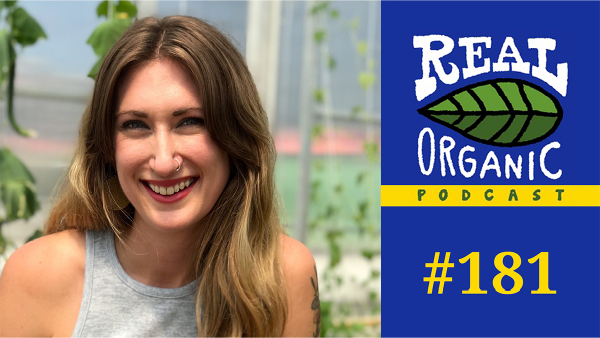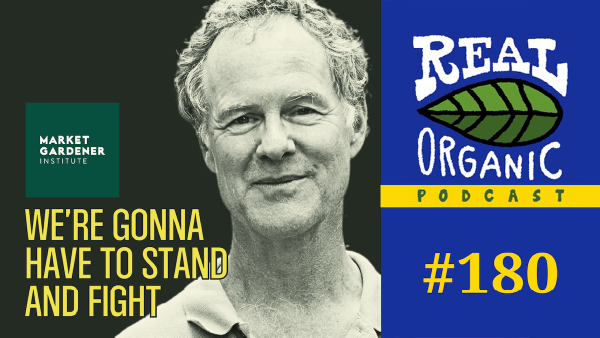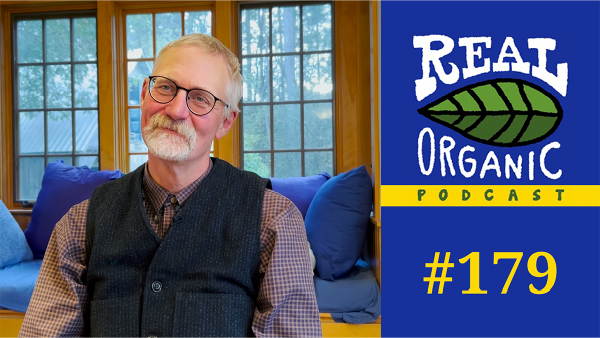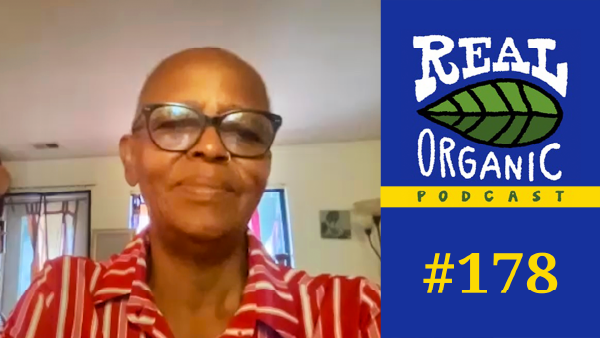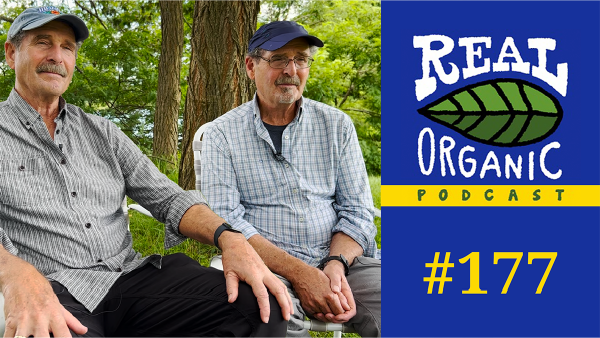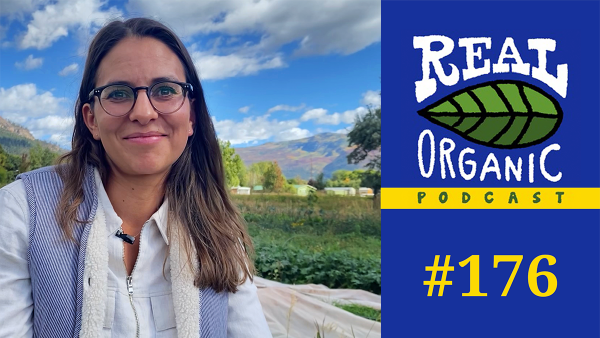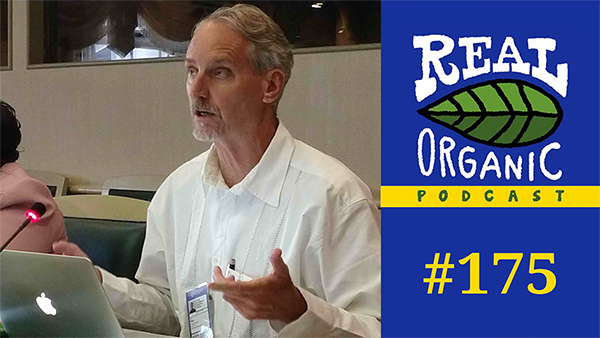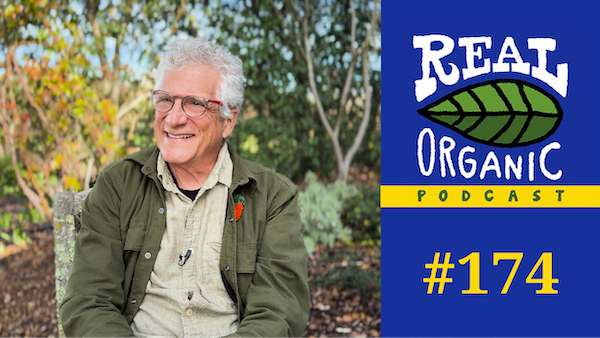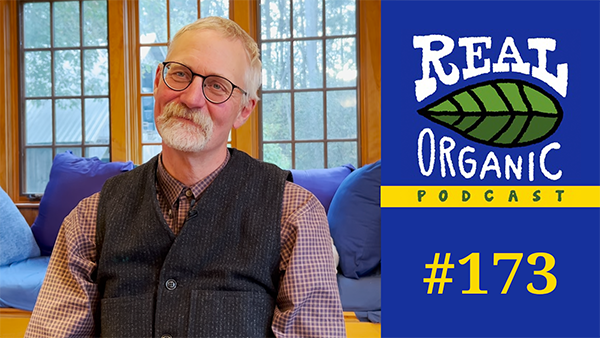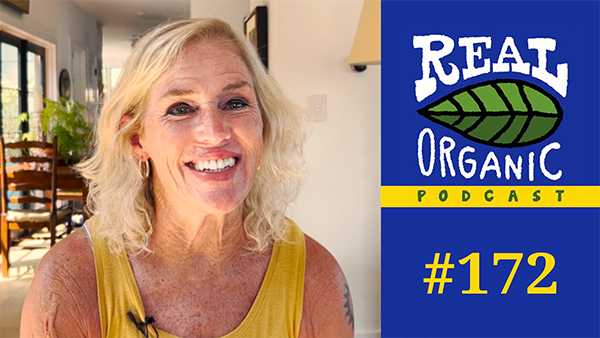Episode #160
Eliot Coleman: Denying Our Understanding Of Real Organic Practices Robs The World
Welcome! You can subscribe and download episodes of our show through your favorite podcast app.
You can also subscribe to receive the video version of each episode on our YouTube channel.
Our Eliot Coleman interview has been edited and condensed for clarity.
Dave Chapman interviews Eliot Coleman:
Dave Chapman 0:00
Welcome to The Real Organic Podcast. I’m continuing a long conversation I’ve been having with Eliot Coleman for many years. Eliot, we talked for hours last night about a lot of stuff – I’d like to go back and touch on some of it. For me the theme that we were circleing around was the relationship of the individual to the group of people. One of the things that has been interesting to me and in the last month is I’ve been sort of wrestling with Zephyr Teachout’s separation of these two forms of civil disobedience. Henry David Thoreau, and Martin Luther King, they both practice civil disobedience, but Thoreau’s disobedience was based on creating alignment between his inner values and his outer actions. King’s was the same, but it was also always guided by how do I change the laws? How do I change society? So, it definitely had an added component that was quite different. And in Zephyr’s book “Break Them Up”, she talks about these two strategies that people use for approaching the things that they don’t agree with in our world. Do either of those, or both of those, ring a bell for you?
Eliot Coleman 1:42
I suppose. My favorite scene in a movie that deals with the idea of objecting to things that you don’t agree with, was in Gandhi. It was during the salt problem, when the Indians had been going down to the ocean and drying water to get salt, and then Brits decided that they owned salt so people had to buy it. And Gandhi rounded up these people, all the Indian farmers and other protesters. They went to the beach and tried to walk onto the beach, but this whole group of Brits were defending the beach and wouldn’t let them through. Row by row, four of these guys would march forward and the Brits would beat them over the head with clubs until they fell to the ground. Then, the women would come and drag them off, and another four would walk forward. It was the most powerful thing I ever saw people saying: no, I’m sorry, you can’t do that.
Eliot Coleman 3:12
At the time, there was a character in the movie who was a reporter for a British paper, and he said he’s phoning in his story;today, Britain lost the moral high ground. Because there was just no way that you could think you had anything to say to people who were willing to walk forward and get beaten on the head – row after row of determined people. That’s my attitude toward any of these schemes where some other group is trying to take over an idea. That’s the thing we’re facing right now with Organic, and you just have to stand there, or walk forward and keep saying no. Whether you’re going to tie that up with eventually changing the law, which was what Gandhi was hoping to achieve, or you’re just standing up for what you believe in – is there any difference? Or I suppose there is a difference in the eventual outcome of this, but to see people who cared so much about an issue, and were willing to put their bodies on the line that… I’d never seen a scene in a movie that was more powerful than that.
Dave Chapman 4:56
Yeah. So, another thing connected this that we talked about last night was the understanding that food, and the food system, is a great crossroads for so many of the issues that we contend with. And I think for me, I’ve come to see it is much more central than when I started. I didn’t have such a vision of what we were doing, being so central to so many other things. Every time I’m pulling the string, it’s connected to everything.
Eliot Coleman 5:41
I agree. It is part of almost every problem out there.
Dave Chapman 5:47
Yeah. And it contains, almost every problem.
Eliot Coleman 5:53
It contains multitudes.
Dave Chapman 5:58
So, I think until people start to get that understanding, they think that this is an issue for foodies. They use that term, and I hate the term, it seems so diminutive to care about food when you address it that way. Could you talk a little bit about why you think it’s the crossroads? Why is it so central?
Eliot Coleman 6:28
The issue, and all of this gets to me, is what Organic farming offers is the most intimate understanding of the way the natural world works. Now, because of the influx of Non-Organic products being sold as Organic, the whole comprehension of what Organic has done, is getting totally lost. There is a mystery going on out there when I plant a seed, and if the soil is right it grows into food that is nourishing people correctly. There is no question that that is true. I mean, when you read some of this research from Holland, about the soil microbiome, and what’s going on around the roots of the plant – the plant can actually give off exudates that stimulate the bacteria that help make it more resistant to pests. I mean, this is miraculous stuff. This is – holy cow, where did that come from? So all of this is going on, and yet we’re being told that hydroponic is Organic. What the organic world offers is the beginning of an understanding of the mysteries out there, that are truly fantastic mysteries.
Eliot Coleman 8:22
I’m on this little farm out in the middle of nowhere in Maine, and even in this location with no resources at all, we’ve been able to create a soil that grows the most beautiful and tasty food anyone has ever seen, with no pests. And yet, because no one is paying attention to the Real Organic, the understanding of that has just totally disappeared. I mean, when people ask me to explain why I’ve been doing this for so long, I usually mystically tell them that every day, I get to commune with the secret of the universe. This is actually what’s going on there, it’s just unbelievable If you pay attention to what’s going on on a good Organic farm. There is so much of a message there, and I’m not talking about the effects of the message and the way that fits into everything – I agree with that, that’s absolutely true. But if you don’t become aware of the mysteries that are going on out there. There’s no way you’re going to understand all the other things, and how if you ate well, you wouldn’t have diabetes, et cetera, et cetera, et cetera. So, people are being denied an understanding of what real Organic farming is actually doing.
Dave Chapman 10:10
Yes, I agree.It was, I would say, inevitable that we would come to this pass in our culture, so it’s not a surprise that this battle is going on.
Eliot Coleman 10:29
You can’t monetize the values I’m talking about, and everything in the modern world needs to be monetized, right? And so, the thing you can monetize is calling it oOrganic. I mean, the Coalition for a Sustainable Organic, saying what we really need is more Organic foods, so we’re just going to call this stuff Organic.
Dave Chapman 10:56
Yeah
Eliot Coleman 10:56
I mean, this is – the thing that makes that possible, is all of our suppose one time friends who have jumped ship. So, I don’t know if the the Organic Trade Association was ever worth anything to Organic, but it has no value at all except to the other side now. And CCOF has become such a pale shadow, not even a shadow, of what it once was, but almost the opposite of what it once was. So, how the heck are we going to make these points when there are these organizations that everybody thinks are the gold standards of an Organic organization that are fighting against it?
Dave Chapman 12:00
Well, it’s interesting; Zephyr, in her book, talks about trade associations as following exactly this gamebook. She wasn’t talking about the Organic Trade Association, she was talking about: this is what happens, trade associations connect a bunch of small players, and then they work for the big players who fund them. They do it in the name of everybody, and people are always confused by this. I think that’s my point: these are almost impersonal struggles that we’re having to go through. And yeah, it is about money! I’m curious, you’ve been around the world a lot, Eliot, you’ve seen a lot of world Organic agriculture. Do other cultures approach this differently? I mean, is America special in the degree to which money trumps all?
Eliot Coleman 12:59
Oh, I suspect that’s a universal sickness. But no, I have visited peasant groups, and parts of the world where they just instinctively understand what’s going on. And, how, if you plug into that, you’re gonna get the food that you need. I was just reading about Brazil. Brazil is one of the centers of using rock powders, like basalt, as fertilizers, and what they found out in their soils down there, is that if they buy fertilizers in the world market, and they don’t produce any of them themselves, this is a big expense. Their soils are not programmed to use those fertilizers like they should be used, and a lot of them leach out almost instantly. However, if they use things like finely ground up basalt, which was a waste product of the rock crushing industry, it is slowly made available in the soil by all the biological powers that are in charge in the soil. Some of this stuff was just fantastic – they are getting yields better than they did with purchased N, A, P, and K by using basalt dust. So these people, because they’re closer to the reality of feeding themselves so they don’t starve, are probably a lot more alert to some of these messages than people would be who were just trying to make money by selling Organic.
Dave Chapman 15:04
Well, it’s interesting – so I was one of the large group, and you were too, who came into this completely non-economically, it wasn’t a business opportunity. We had an excitement. You could call it romantic, you could call it an ethical belief system, but something about it presented something with a lot of meaning, and we pursued that. Then, after a while, we said, geez, you know, we need to figure out how to make a living at this, if this is what we do. I mean, if I don’t have a day job. And we we did, we all started farms that actually were economic entities. I think there’s still a huge difference between that and somebody who says the reason I’m here is to make money, and this is the arena in which I’m going to do it.
Eliot Coleman 16:05
They’re in the wrong arena.
Dave Chapman 16:07
They’re in the wrong arena.
Eliot Coleman 16:09
Yeah. I mean, when you read that 40% of the income of US farms in general are coming from government subsidies, who would want to get into something like that? Thinking they’re gonna make a lot of money.
Dave Chapman 16:28
Well, we see that most of that money goes to subsidize the wrong things.
Eliot Coleman 16:33
Yes.
Dave Chapman 16:34
So, it’s actually enabling a bad agriculture that is destructive.
Eliot Coleman 16:42
And then the government compounds this all with their Climate Smart Agriculture, all of this stuff which hasn’t been thought out past the very front edge of these ideas. It’s actually going against what they’re trying to do, it’s that badly planned.
Dave Chapman 17:10
Yeah. I see that there’s a lot of confusion around it, because people celebrate that the government is trying to do something, and that the USDA is acknowledging that how we farm has a big impact on climate. Can we do better? I talked to Michael Pollan about this, and he said: well, some of it is going to do something good, but a lot of it is not. I won’t speak for Pollan, I’ll speak for me, a lot of it is not going to do something good, and the question is, what gets lost in that transaction? I think that’s the danger here: organic is actually being pushed aside in Congress. I’ve been talking to somebody who works a lot in Congress, and she said, if you want to talk about Regenerative, everyone’s all ears and excited, but if you talk about Organic, they don’t want to talk about it. How can how can you celebrate something that you would call Regenerative agriculture and not celebrate organic?
Eliot Coleman 18:24
Yeah. Well, we were just talking about how that film ‘Kiss the Earth’ was so disappointing, and that the new second film actually goes out of its way to explain that Regenerative doesn’t mean using glyphosate and things like that. That’s a hopeful step because the trouble with that first film, I think, was that all the speakers were well known celebrities. There was hardly a farmer in the in the film, so it was just the people who were impressed by the myth.
Dave Chapman 19:08
Again, I mean, when I look at the large list of people involved, I think they’re incredibly well meaning. I don’t think that they approach that cynically, I just think that they didn’t understand things.
Eliot Coleman 19:21
Yes.
Dave Chapman 19:24
I don’t call that greenwashing, I call that having a deep understanding – that’s different.
Dave Chapman 19:30
Yeah.
Dave Chapman 19:30
I think that their intentions were very positive.
Eliot Coleman 19:33
But the result was disappointing.
Dave Chapman 19:38
The result was disappointing – it was a start? What I think is critical in all of that is if they want to call it Regenerative, there needs to be a real regenerative movement. It’s just that simple.
Eliot Coleman 19:52
Yeah,
Dave Chapman 19:52
They should use those words.
Eliot Coleman 19:55
Those words got stolen before they even got started.
Dave Chapman 19:59
I know, but there there are a lot of people who do mean something very positive by that term regenerative, very positive.
Eliot Coleman 20:05
Yeah.
Dave Chapman 20:06
And that’s fine, but I think that they need to make clear that they’re not they’re not with Syngenta, they’re not with Bear who are defining the terms now.
Eliot Coleman 20:15
Well, speaking about Bear, remember that letter I sent you from the Spanish regenerative farmers who were writing to bear and saying, hey guys, you aren’t in charge of this, there is no natural connection between glyphosate and Regenerative Agriculture. That was a fantastic letter. And these are people who call themselves Regenerative, but they objected totally to Bear taking this over and making it part of their business.
Dave Chapman 21:02
Yeah. It has to happen for that term to have any life, it will be crushed otherwise.
Eliot Coleman 21:09
Yeah.
Dave Chapman 21:10
So Eliot, can we talk about corporations a little bit?
Eliot Coleman 21:15
Sure.
Dave Chapman 21:15
You know, I shared that that article that recent civil rights article about Walmart. So, Walmart, we see the Walton family giving millions and millions of dollars to support, let’s say responsible biological agriculture, that’s the intention. Those are the words that they use, and it’s a lot of money. At the same time, as the article points out, Walmart is the biggest single seller of food in America, of Organic food and of conventional food. The way they got to be so big was by making sure it was the cheapest food in America. So, on one hand, their saying, well, we have to be more responsible about how we grow food, which means it’s going to cost more. Being responsible means we’re going to pay the people who do the work enough to make a decent living, and we’re going to treat the animals with respect and have animal welfare standards, and we’re going to treat the soil with respect and make sure we’re not just mining it. All these things that are the hallmarks of Real Organic, and I would say of real Regenerative, those things can’t actually exist in that system as defined by Walmart as a vendor or as a marketplace. How do we make sense of that? Do we do we celebrate that the Waltons are getting it? Or do we say we really need to find a totally different model?
Eliot Coleman 23:10
Well, they have an awful lot of money to give away because they as a family group have inherited 50% of the Walmart business. Is that philanthropy? I think the answer to that depends on whether they want to give that money to achieve something that makes them look good, or that actually gets somewhere. We’re always wanting to have cheaper food, and society is always coming to farmers, because they grow food, and telling them this is something that farmers should be concerned about so more people can afford it. But it would make much more sense to have fair and honest salaries for everybody in the US so they can afford to buy food at a price that allows the growers, the harvesters, and the packers to make a fair living themselves. I don’t think the people who want their food to be cheaper have any idea that they are making life very difficult for all these other people on the planet.
Dave Chapman 24:42
Yeah, well, let’s not leave out the people who work in the stores or the people around the stores who are not paid wages that allow them much security in life?
Eliot Coleman 24:57
Yeah. So, we’ve been focusing on the food rather than on the system. The powers that be don’t want us to focus on the system, because the system is set up to maximize their well being. And if in the process that minimizes the well being of eaters, well, that’s a byproduct.
Dave Chapman 25:31
Yeah. The headlines for the conversations that we have in the public, these educational efforts are always called things like Food Fight. And I go, well, actually, no, this is more of a democracy fight.
Eliot Coleman 25:47
Yes, exactly.
Dave Chapman 25:51
It’s like, we’re looking at the Great Oz on the screen instead of the little man behind the curtain.
Eliot Coleman 25:58
You got it.
Dave Chapman 26:05
I told you of the recent exploration I’ve had the word ‘monopsony’. It’s not the easiest word.
Eliot Coleman 26:14
Yeah.
Dave Chapman 26:15
It’s a counterbalance, an adjunct to monopoly, which we’re all used to because we all played the game, monopoly rolls off our tongues. But monopsony does not. A monopoly is a consolidation of power amongst producers. A monopsony is a consolidation of power amongst merchants. So, Walmart would be a monopsony, and Bear would be a monopoly. Driscolls would be a monopoly. Monopolies, they tend to start at around 4% of the national market; if you get 4% of the national market, you’re approaching monopoly-hood. Driscoll has over 70% of the organic berries sold in America, so they’re a monopoly. And over 50% of the conventional berries! So, you know, that’s just one an example of a monopoly. Walmart would clearly be a monopsony, and the problem with these is that when some company has that much power, they completely control the price and the working conditions and that’s a reason why this isn’t just about food. Food is the crossroads, but this is about the structure of power, wealth, and democracy in our country and in the world, for that matter.
Dave Chapman 28:01
But it’s a little bit intimidating to take that on in the sense that if it’s about food, you can grow good food and you can feed people with it. You do address these other issues, because they’re not going to Walmart to get that food, they’re going to your stand. But as we said yesterday, you could do that and be so successful, and you are that successful – I eat your food, and it’s really fantastic. I feel myself getting stronger and healthier by the moment – I’m serious! It’s delicious, and it has a goodness that is so obvious, and has been forgotten and lost, I think, in our in our culture. For many people, they just never had food like that.
Eliot Coleman 28:57
Well, I’ve never felt that the Driscolls and all of the fakes out there are any threat to this farm, because our customers love us, because we produce the best tasting food they’ve ever eaten. We work hard at it, it isn’t like this is something that we just stumble into. Do we make big bucks doing this? No, absolutely not. We make a fair living, which is what anyone should look at. I’ve always had this idea about fair prices – that a fair price has to be fair, both to the buyer and the seller. If the seller isn’t getting a fair price, they can’t afford to keep doing what what they’re doing, and that’s an important concept here. Walmart is taking over all of these areas because they’re able to drive down prices. When you’re the big vendor, and you tell people well, the most we can pay for a carrot is ‘x’, you have far too much power.
Dave Chapman 30:37
Yeah. As we talked about yesterday, it’s true that your farm is essentially untouched by Walmart. you you have a customer base that is loyal, and they will respond and pay what you need to charge in order to make a living and keep offering that wonderful service to them. But of course, your kids don’t live here, they live out in the rest of the world. My kids don’t live on my farm: well, I have one who does right now. But you know, my sisters, all the people I love and our dear are still very much engaged in that drama of who controls our food system?
Eliot Coleman 31:24
Yeah. I occasionally send care packages of our food to my children, or actually just friends. There are some summer customers who I become such good friends with that for Christmas, I will send them a care package of the best of the best. But yeah, otherwise, they’re at the mercy of that world out there.
Dave Chapman 31:54
Well, you have worked to change that world out there since you started farming. I mean, you have! You haven’t just done a beautiful small farm that only the people who come in and get their food here know about, your farm is enormously prominent in national conversations. You made the decision to make that happen, it didn’t just happen by mistake. You went out and spoke many, many times. You wrote books, you had a TV show, even. You’ve made a lot of effort to change the system.
Eliot Coleman 32:38
The the best thing that COVID ever did was cancel all those conferences I used to have to go and speak at. I just hated airplanes and airports, so I’ve stopped doing that.
Dave Chapman 32:54
Yeah.
Eliot Coleman 32:55
Even though the COVID crisis is momentarily over…I worked hard to try and create some vague form of paradise here, and who wants to leave paradise?
Dave Chapman 33:14
Yeah.
Eliot Coleman 33:17
Which all goes to show that you can create paradise with very few resources. We started here with nothing, we cleared this land from Spruce Rir forest, for God’s sake! And it’s because the biological systems out there, the ones that I keep referring to as magical, truly are, because they’re alive. Plants make soil. Everybody thinks soil makes plants. No, plants make the soil just by growing there. We’re running this whole farm now powered by just green manures, because it makes so much more sense. We’re not bringing in any suspicious compost, the provenance of which we have no idea. Compost is a little scary that way because by the time everything’s all broken down, you have no idea what went into that compost in the first place.
Dave Chapman 34:29
Yeah. Eliot, let’s talk about that just a little bit. I’m sure that many people who will listen to this don’t really understand what that means, to sell fed farm and no inputs. Could you talk about the biological process whereby you can grow your own fertility?
Eliot Coleman 34:50
Yeah, well, when Organic started, it was based on creating a biologically active soil. That was the key, and that meant you were doing things like green manures, crop rotations, cover crops, etc. That had nothing to do with buying inputs. But you were creating a biology on your farm and the change in organic we have from 19-
Dave Chapman 35:28
Eliot, forgive me for a moment when – again, because some people listening won’t be farmers – when you say green manure. growing green manure, what does that mean?
Eliot Coleman 35:37
A green manure is a crop, and very often a legume. It’s a legume because they are able to extract nitrogen from the air and store it on its roots. Green manure is something you’re growing on your soil specifically to turn into the soil to add nutrients for future crops. A cover crop is a lighter version of that, something that you’re growing just to keep the soil covered and protected from leaching overwinter, and so forth. A crop rotation is growing different crops year after year on the same soil so you’re not always taking the same nutrients out, and you’re avoiding the buildup of pests and diseases that would have happened if you kept growing the same crop all the time. But all of the initial use of those natural techniques has been taken over in today’s world by purchased Organic fertilizers. Why are you purchasing organic matter? There is nothing easier to create on your own farm. All you need is a seed, soil, sunlight, and CO2. And yet, we are we are running now, as I see all over the place, Organic farming as if it’s chemical farming, as if you have to buy in all of these nutrients. In chemical farming, you absolutely have to do that because you have nothing else to work with, but on the Organic farm, my gosh, the amount of biological fertility you can create yourself just by growing green manures and cover crops!
Eliot Coleman 37:43
All this No-till stuff, I’m always told by people, oh, but you should see all the research on No-Till. And I ask them who did that research that couldn’t have been done by the people who are trying to sell herbicides, could it? Yes, it was all done by them, they’re the only people who had any incentive to do it! So we till under our green manures, we use a roto tiller and only tilll into the top four inches, and what that does to create a biologically active, fertile soil out of nothing is unbelievable! These are all things that farmers could be doing on their own farm. The idea that the independent creation by farmers of the fertility on their own farm has been replaced nowadays, because of the unbelievable advertising for all of these Organic miracle stimulants that everybody seems to think are absolutely indispensable. This is such a crime.
Dave Chapman 39:12
I suspect that those stimulants become more important as your soil becomes more degraded. Any impact, any addition can help stimulate a very depleted, lifeless soil.
Eliot Coleman 39:29
Yeah, if you read literature from the last however many years, human beings have been farming. From whatever culture you want to read it from, the Egyptians, the Babylonians, the Romans, the Greeks, or the Asians – all of that stuff says the same thing. The way you keep a soil fertile is you put organic matter back into it, and what makes a soil fertile is not that it runs out of nutrients, but it runs out of organic matter. You see this throughout the literature, and the people who have learned that, who learned to focus on putting organic matter back into their soil to keep the biological life of flourishing, they still have perfectly wonderful farms.
Dave Chapman 40:30
Let me ask you a question. This one will be of more interest to the farmers who are listening. You’ve looked at, and maybe read Helen Atthowe’s book about the living mulches, yes? She had this interesting observation, which was that when she grew living mulches in the past, and she was growing in a pretty wide path at the time, and mowed it and blew the mowings onto her growing beds, that she actually had to cut out the compost because she had too much nitrogen.
Eliot Coleman 41:05
Yeah.
Dave Chapman 41:06
But she also got very high levels of potassium and some of the other elements. And I thought, well, isn’t that interesting? Is the living mulch, is the green manure – which is a green manure intercropped with a cash crop – is that making those nutrients, those mineral elements available that were locked up through the biological activity? Or is it just taking the potassium from the path and putting it in the bed? I ask this because a soil scientist who we both respect said, yeah, you’re taking from the path and putting it in the bed, so you’re depleting the path, and you’re gonna run out of potassium. And I’m not sure that that’s true, so I’d like your opinion on that.
Eliot Coleman 42:04
The genius of some of that is that the tool that you’re cutting it with also throws it over into the bed. If you do what a lot of the No-till types do, and bring it in and spread your mulch, that’s a lot of work. If you can go down your path and blow it in there, that’s genius! That’s a great system. It takes a long time to exhaust minerals in the soil. As I said, the literature over thousands of years have pointed out that when soils become less productive, it has nothing to do with exhausting their minerals, it has to do with exhausting the organic matter in there because you’re not treating the soil correctly. So, I guarantee you that there is at least a thousand years of potassium under that path that your crops can be growing on and using, especially where you’re taking it and blowing it on the bed. Well, maybe next year, the bed is the path, and the path is the bed. It’s a great system.
Dave Chapman 43:31
Yes it is. You know, in the old traditional farming systems, the crop was eaten by the human and the human;s manure was returned to the cropland.
Eliot Coleman 43:46
Yes.
Dave Chapman 43:47
So there really was a closed loop. But now, that’s pretty much one way.
Eliot Coleman 43:51
Well, for a while there, though, the animal manure was taking the place of the human manure that was being dumped into the river and going out to sea. It was a pretty good deal, because the people who were paying attention at the time were suggesting, okay, if we’re putting animal manure on the soil where we grow our food, we should put human manure on the pastures that are growing animal food. If you did that, then you wouldn’t be dumping into the river and you wouldn’t be losing it all. You know, during the the years when we were just figuring out what was going on in agriculture, all that animal manure was making up for the fact that we were flushing the human manure down the rivers.
Dave Chapman 44:52
Yeah.
Eliot Coleman 44:55
Could we get back to a circular system? When I was running a school in Vermont, when you were standing in the dining room, looking out the beautiful large windows, you could see a pasture, and it had sheep and cattle grazing there. But I was also aware that the septic field for the dining room, which was attached to a dorm, was under that field. And this was the perfect way to teach the students that there was no such place as “away”. That if they had extra nail polish remover, and they put it down the sink, they were eating it. It was going to come back because the septic field was right under that pasture. I remember being on a farm in Vermont and wandering around, and finding where the dump was, and this was a 200 year old farm. You went through the woods to where there was the edge of a field, and they just dumped all their stuff over it. The only things you found were metal, glass, and leather, because these are the things that either didn’t break down or took a long time to break down.
Eliot Coleman 46:27
There were no chemicals, there were no little cans of Sani-flush or something like that. So the old world was pretty safe in using its trash. But today, oh my god! If you looked at your medicine cabinet, or where keep your beauty supplies or whatever they are, and picture pouring that all down the drain and it coming up where your cattle are grazing, that’s just a horrifying situation. By producing all these products, we’ve produced our own inability to maintain the circular system that might once have existed.
Dave Chapman 47:22
Right. That circular system could exist again and must, will, exist again. Eliot, before we just leave this, and I know that this is something that’s been explained in the world, but I would like to hear your take on it: when you say that the organic matter is what is critical for building the fertility of the soil. What is the process whereby that organic matter makes these minerals that aren’t available, available? I mean, the mineral part of the soil is mineral, it’s filled with minerals, but they’re not available to the plant.
Eliot Coleman 48:03
48% of the soil is mineral.
Dave Chapman 48:05
That’s right.
Eliot Coleman 48:07
There is a process going on that’s been going on since plants first existed, it’s that the roots of plants give off carbon dioxide. If carbon dioxide is given off in the soil, it combines with soil water to produce carbonic acid. Carbonic acid is a delightful product, because it has just enough power to etch nutrients, which exists in all those rock particles – soil is just ground rock – and put them in a form that’s available to the plant roots. That is especially true when you till under – shallowly – a green manure. It actually makes more sense to do that – where the carbon dioxide turns into carbonic acid in the soil – than to put everything in a compost heap. If you let it happen in the soil, you have all these forces going for you. You read the 1938 yearbook of the Department of Agriculture, and whoever wrote the the article in there that I’m thinking of just goes on how this is the power. Organic matter and its effect on the soil is the power that is making everything work in the soil, that is making the minerals available and so forth. Rather than just saying organic matter, sometimes I prefer for to say humus, because humus is the end result of the decomposition of organic matter in the soil. That’s the stuff that makes the soil mellow and easy to work and things like that.
Dave Chapman 50:13
And what about the mycorrhizal fungi? Because that is a big part of it.
Eliot Coleman 50:19
Yeah. I mean, they’re there. And they are especially effective at making phosphorus available to plants. I’m told that if I till, I’m killing mycorrhizal fungi, but I have the feeling that if they were there once, they will come back immediately because there’s spores on the soil. And anyway, I’ve never seen a disadvantage to tilling. And all the time I’ve been here: in fact, I will state that we wouldn’t have a farm here if we hadn’t spent 50 years tilling local organic matter into the soil, because we had nothing to start with. We had to create what’s here. At the very beginning of there was a wonderful large horse manure pile nearby that allowed this farm to get a leg up. But since then, it’s just been tilling organic matter.
Dave Chapman 51:28
Yeah. Well, I’m not convinced that tillage ends mycorrhizal fungi because we’ve had our soil tested and we’re doing very well on that. Sometimes we till, sometimes we don’t till, we’ve tried this, that and the other thing. I have no religion about it. I think that the questions are very interesting, and you and I have talked about how we’re really just at the beginning, not at the end of all this.
Eliot Coleman 51:55
Oh, we are barely at the beginning. I mean, when you and I are talking about the unknowns out there, we both agree that there is just so much to learn. Especially all the biological effects of this crop growing, and how does that affect that crop next year? I mean, this is, if you want to start an endless research project, this is the endless research project.
Dave Chapman 52:31
Right. I said we experimented with growing alyssum under the tomatoes, and well, that’s great. Alyssum! But there are like, a couple thousand other plants that you might grow there.
Eliot Coleman 52:41
Yeah.
Dave Chapman 52:41
I have no idea what the impacts are. It’s for the next lifetime, probably. So, Eliot, as we come to our conclusion, what are your thoughts, or anything that you’d like to say? We’ve talked, and I guess the one thing we didn’t say which I was going to talk about was: the reason you got into Organic farming and that it excited you was it built on the part of you that was a rock climber. That you love the challenge of it, and you loved the demands it placed on you to be very competent, to pay very close attention, and the thing you like best about it was you never got to the top of the mountain.
Eliot Coleman 53:33
Well, the mountain doesn’t have a top, that’s the beauty of this. You’re always going to find something new to learn, and if you’re climbing either rocks or mountains, standing on top is the dullest part of the day! The fun thing was trying to figure out how to get there, which is why I’ve always had a passion for rock climbing. When we were starting out and there were all these experts and we were anything but experts. They all had PhDs, none of us had PhDs or anything but English literature or something like that. They were saying you couldn’t do this, and we were doing it! That was the best part of the whole thing. Us totally untutored hippies were out here, and what is amusing – and I’ve been here since 1968 which a long time – not once in all those years has an entomologist from the University of Maine ever come down here to find out what’s going on. I mean, when you think about it, I’m right next to them. They have entomologists who were claiming you need pesticides, you can’t grow without them, and I’m down here, quietly disproving everything. They’re telling people, and nobody’s ever showed up to talk to me. I find that disappointing.
Dave Chapman 55:23
Yes. That is changing, I have definitely had entomologist from the University of Vermont come to visit our farm and with great curiosity and affection. As somebody once said to me, entomologists are very benign. They’re very kind, curious people, in my experience. I understand that you’re talking about people who had a very chemical outlook, but the entomologists I know do not have that outlook, they’re really interested in our work.
Eliot Coleman 55:53
My favorite entomologist story was on my trip around European Organic farms with the USDA study group, back in 1980. I set up a European tour for them, and took them. One of the members of their study team was the Dean of Entomology at a major Midwestern University who was on loan to them. We were visiting this really exceptional farmer standing on the edge of the field talking to him through the interpreter, it was in Germany, and the entomologist left the group and wandered out in the field. And he’s leaning over and sweeping his hand above the crops to see what insects and stuff are there. After about five minutes, we noticed he was just standing there, and we’d looked over at him, and he said, we can’t do this well with pesticides!
Eliot Coleman 56:54
That was such a striking thing: I never thought he was the same person again, beause he had seen… God and His splendors, he heard the touch that nature renders. That’s a line from one of my favorite poets. He’d seen that it actually worked, and he was honest enough at the end of the day to tell the farmer that he learned more there in the last hour and a half than he did any of the hundreds of conferences he went to all the time. Fascinating!
Dave Chapman 57:42
You know, Vincent Stanley tells that story about Patagonia when they were trying to switch over to organic cotton. The team at Patagonia really didn’t get it. They explained, they lectureed, and they didn’t get it. So then they decided to take them on bus tours out to the fields.
Eliot Coleman 58:01
Oh this is great.
Dave Chapman 58:02
They took them out to the chemical fields, and it stank, because they use so much chemicals on cotton.
Dave Chapman 58:08
Yep.
Dave Chapman 58:09
It stank, and your eyes hurt. It was a horrible place to be, and the soil was clearly dead. There were no worms, there was no life in it. All I had to do was take people out to a chemical farm for a day and then take them to an Organic one. And they went, okay, we get it. We don’t want to be part of that anymore, we want to do this.
Eliot Coleman 58:29
Yes!
Dave Chapman 58:30
We want this to be the world we’re building.
Eliot Coleman 58:32
Yes.
Dave Chapman 58:33
That’s that same experiential education of getting people to actually see the difference, and they understand it intuitively at that point.
Eliot Coleman 58:44
Yeah. So a lot of the experiences like I’ve just been relating – we scared the dickens out of the other side, because we were threatening everything that was at the basis of their business. They were selling pesticide, we didn’t need pesticides. They were selling soluble fertilizers, we didn’t need soluble fertilizers. You sort of wished they’d had the sense to say, okay, these guys don’t need the products we’re now making, could we make something that they would be interested in? That’s interesting! I happen to think that even back in the early days, if the chemical companies had offered better soil analysis, plant tissue analysis, ways for us ameteurs to keep our finger on the pulse of that wonderful system out there, we would have signed up immediately. They would have had a whole business of advising good farming. But they weren’t interested in that, there’s no money in selling services like that. There’s only money in selling products. As Scott used to say, the ideal product for an industrialist is something that wears out quickly and leaves a habit behind. Chemical fertilizers are about as good as you could get on that one.
Dave Chapman 1:00:35
It must have been a pretty special thing to have Scott as your mentor.
Eliot Coleman 1:00:41
Oh, dear, it was the best. I used to work with him part time in the woods when I first came here, and it was like the best college history course you ever had in your life! I mean, unbelievable. The guy had been everywhere, done everything. Yeah, that was just delightful.
Dave Chapman 1:01:04
All right, Eliot. Last words, anything you want to say that I left out?
Eliot Coleman 1:01:08
No, but I do want to say, Dave, that this whole project you’re doing with the Real Organic Project is so totally worthwhile. And without you, it wouldn’t be happening. I think you need to understand there’s a lot of us out there who are very appreciative of the enormous amount of time and energy you put into this, and wish you could be cloned and double cloned and triple cloned. *laughs* You and I probably agree on this: whether there’s any way we will ever come out the right end of this, boy, the forces arrayed against us are so incredible. I have a quote over there from Churchill during the War. And he said, never give up, never give up, never give up! So we’re not going to give up.
Dave Chapman 1:01:24
Yeah.
Eliot Coleman 1:01:34
And I hope we continue to worry the bastards to death. *laughs*
Dave Chapman 1:02:26
*laughs* All right, Eliot, thank you very much.
Eliot Coleman 1:02:28
Yeah, thanks Dave.


